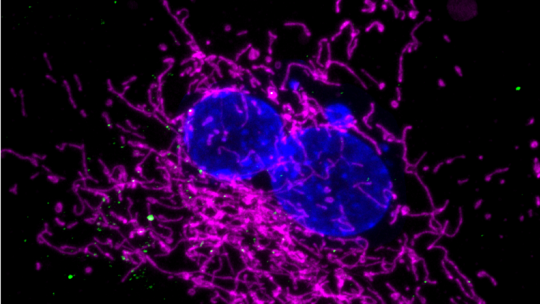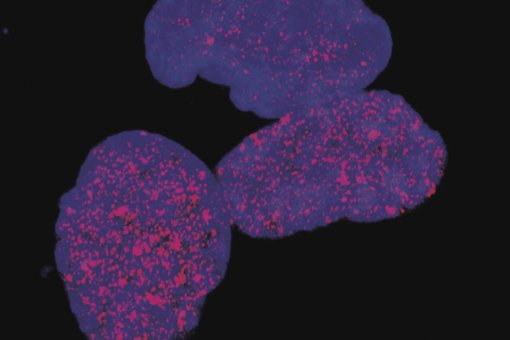Images
Participants





Contact

- Researchers led by Dr. Manuel Serrano at IRB Barcelona have identified new therapeutic targets to reduce inflammation associated with ageing and chronic diseases.
- The study demonstrates that RNA-type nucleic acids released by the mitochondria of aged cells enhances inflammation.
- The work has been published in the journal Nature Communications.
Senescence is a dormant state reached by damaged or aged cells. A team of researchers led by Dr. Manuel Serrano at IRB Barcelona has discovered a key process underlying the inflammation that these aged cells cause.
Published in the journal Nature Communications, the study reveals how a specific molecule, namely double-stranded mitochondrial RNA, elicits a strong inflammatory response. Mitochondrial RNA is normally located inside mitochondria, but—as shown in this study—it can "escape" from the mitochondria of aged cells, triggering alarm signals. This inflammatory process, which occurs in aged and senescent cells, is linked to diseases such as fibrosis and ageing-related disorders.
The research demonstrates senescent cells accumulate more mitochondrial RNA as a result of the depletion of the enzyme responsible for removing it. Furthermore, RNA sensors, which detect these fragments in the cell, are elevated in aged cells. The accumulation of this mitochondrial RNA and activation of the sensors are responsible for much of the inflammation produced by senescent cells, thereby contributing to inflammatory ageing or "inflammaging".
Using animals models, the scientists have observed that inflammation is significantly reduced when the production of RNA molecules is inhibited. This finding thus suggests that blocking this pathway could have therapeutic applications.
"These results uncover a key molecular pathway underlying the inflammation that accompanies cellular ageing. We now know that mitochondrial RNA is not only a marker but also an active factor in this process. This knowledge paves the way for new strategies to tackle diseases associated with ageing and inflammation," says Dr. Manuel Serrano, currently a researcher at Altos Labs (Cambridge, UK).
By identifying these proteins, the scientists are opening up new prospects for the development of treatments that reduce the inflammation associated with senescent cells.
"We can now explore new ways to treat chronic diseases associated with senescent cells, such as ageing, fibrosis, and cancer," comments Dr. Vanessa López-Polo, first author of the study, who has completed her PhD studies at IRB Barcelona and will soon be embarking on a postdoctoral period at the University of California San Francisco (UCSF).
The next steps in the research include exploring whether this discovery can benefit other senescence-related diseases and whether the results obtained in mice are translatable to humans.
This project has been possible thanks to international collaboration between IRB Barcelona and the Albert Einstein College of Medicine, the Vall d’Hebron Oncology Institute, and the University of Cantabria IDIVAL.
The work has been funded by the European Research Council, the Ministry of Science, Innovation and Universities, the Government of Catalonia, the National Institutes of Health (NIH), ”la Caixa” Foundation, and the Spanish Association Against Cancer.
Related article:
Release of mitochondrial dsRNA into the cytosol is a key driver of the inflammatory phenotype of senescent cells
Vanessa López-Polo, Mate Maus, Emmanouil Zacharioudakis, Miguel Lafarga, Camille Stephan-Otto Attolini, Francisco D. M. Marques, Marta Kovatcheva, Evripidis Gavathiotis & Manuel Serrano
Nature Communications (2024) DOI: 10.1038/s41467-024-51363-0
About IRB Barcelona
The Institute for Research in Biomedicine (IRB Barcelona) pursues a society free of disease. To this end, it conducts multidisciplinary research of excellence to cure cancer and other diseases linked to ageing. It establishes technology transfer agreements with the pharmaceutical industry and major hospitals to bring research results closer to society, and organises a range of science outreach activities to engage the public in an open dialogue. IRB Barcelona is an international centre that hosts 400 researchers and more than 30 nationalities. Recognised as a Severo Ochoa Centre of Excellence since 2011, IRB Barcelona is a CERCA centre and member of the Barcelona Institute of Science and Technology (BIST).




